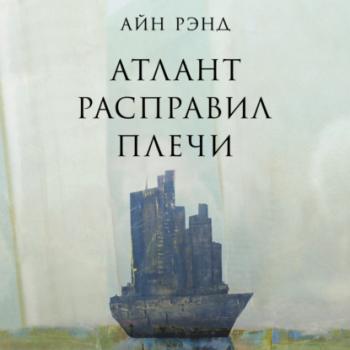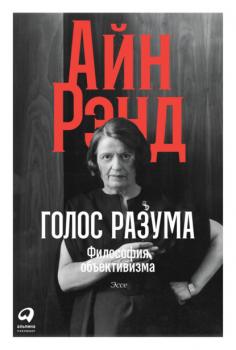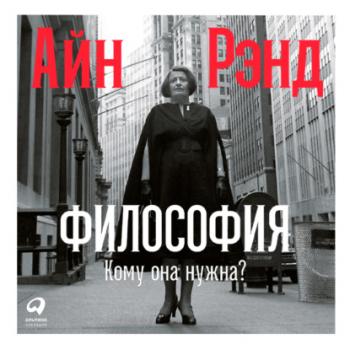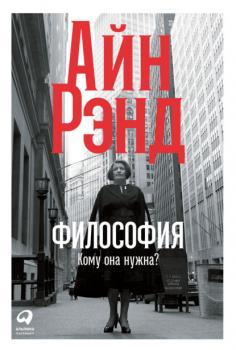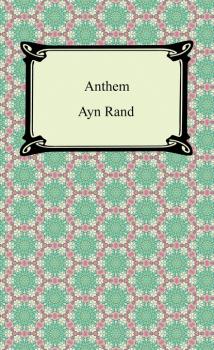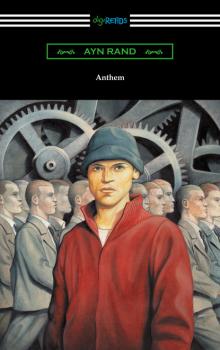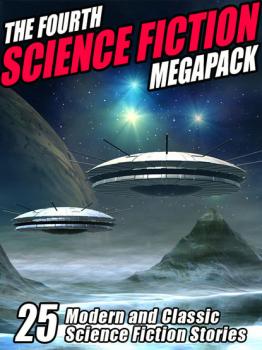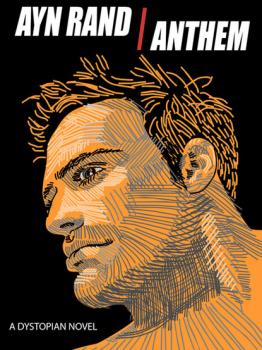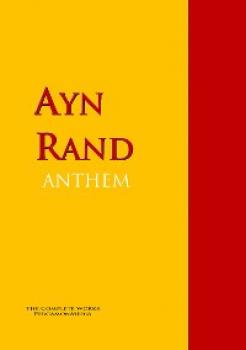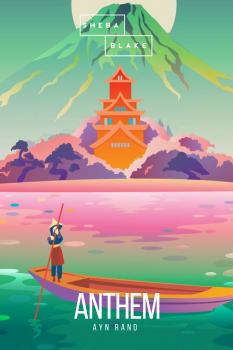Айн Рэнд
Список книг автора Айн РэндАтлант расправил плечи
К власти в США приходят социалисты и правительство берет курс на «равные возможности», считая справедливым за счет талантливых и состоятельных сделать богатыми никчемных и бесталанных. Гонения на бизнес приводят к разрушению экономики, к тому же один за другим при загадочных обстоятельствах начинают исчезать талантливые люди и лучшие предприниматели. Главные герои романа стальной король Хэнк Риарден и вице-президент железнодорожной компании Дагни Таггерт тщетно пытаются противостоять трагическим событиям. Вместо всеобщего процветания общество погружается в апатию и хаос.
Голос разума. Философия объективизма. Эссе
Смерть Мэрилин Монро, освоение космоса, война во Вьетнаме, противостояние США и Советского Союза, позиция женщины в политике, жесткая критика Католической церкви в ее попытках регулировать интимную сторону жизни общества. Эти и другие знаковые события и процессы второй половины XX века Айн Рэнд осмысляет через призму объективистского мировоззрения, оставаясь яростной защитницей индивидуальных свобод и частного капитала. В книге собраны лекции и статьи 1961–1981 годов – «золотой фонд» интеллектуального наследия писательницы, по сей день не оставляющего равнодушными всех мыслящих читателей. Их дополняют пять эссе философа Леонарда Пейкоффа, который оставался близким другом и соратником Рэнд до последних дней ее жизни.
Философия: Кому она нужна?
Этот сборник эссе стал последней работой Айн Рэнд, над которым она работала перед смертью в 1982 г. В нем она обобщает и отстаивает свои философские взгляды, которые легли в основу ее бестселлеров «Атлант расправил плечи» и «Источник». Согласно ее идеям, разум – это не просто отличительная, но фундаментальная черта человека, благодаря которой он выживает. Для Айн Рэнд философия – это сила, формирующая сознание и характер индивидов и наций; выбор человека не в том, придерживаться ли ему той или иной философской концепции или нет, а в том, какую принять для себя. В прочих эссе Айн Рэнд критикует этические взгляды Канта, пишет о значимости языка и объясняет, что необходимо для формирования рациональной и сознательной философии.
Философия: Кому она нужна?
Этот сборник эссе стал последней работой Айн Рэнд, над которым она работала перед смертью в 1982 г. В нем она обобщает и отстаивает свои философские взгляды, которые легли в основу ее бестселлеров «Атлант расправил плечи» и «Источник». Согласно ее идеям, разум – это не просто отличительная, но фундаментальная черта человека, благодаря которой он выживает. Для Айн Рэнд философия – это сила, формирующая сознание и характер индивидов и наций; выбор человека не в том, придерживаться ли ему той или иной философской концепции или нет, а в том, какую принять для себя. Писательница критикует этические взгляды Канта, пишет о значимости языка и объясняет, что необходимо для формирования рациональной и сознательной философии.
Anthem
Upon original submission of «Anthem» to Macmillan publishing the book was rejected on grounds that «the author does not understand socialism.» For the harshest of Ayn Rand's critics this might as well be an analysis of all her work. However, for those who revere Rand's work and subscribe to her particular philosophy of objectivism this novel could be set in the present day instead of some unidentified future in which mankind has entered a dark age characterized by irrationality, collectivism, and socialistic thinking. In this dystopian novella we find a world where technological advancement is now carefully planned and the concept of individuality has been eliminated. The central characters of the story are Equality 7-2521, a free thinking inventor, and his love interest, Liberty 5-3000. Like most dystopian works, «Anthem» describes a strange and unfathomable world which could never exist. It is in the creation of this extreme world the Rand draws a parable to warn us against what she believed were the perils of socialism.
Anthem
Upon original submission of “Anthem” to Macmillan publishing the book was rejected on grounds that “the author does not understand socialism.” For the harshest of Ayn Rand’s critics this might as well be an analysis of all her work. However, for those who revere Rand’s work and subscribe to her particular philosophy of objectivism this novel could be set in the present day instead of some unidentified future in which mankind has entered a dark age characterized by irrationality, collectivism, and socialistic thinking. In this dystopian novella we find a world where technological advancement is now carefully planned and the concept of individuality has been eliminated. The central characters of the story are Equality 7-2521, a free thinking inventor, and his love interest, Liberty 5-3000. Like most dystopian works, “Anthem” describes a strange and unfathomable world which could never exist. It is in the creation of this extreme world that Rand creates a parable to warn us against what she believed were the perils of socialism. What is clearly a response to the oppressiveness of the Soviet Union, “Anthem” continues to resonate with those fearful of collectivist political philosophy gone too far. This edition is printed on premium acid-free paper.
The Fourth Science Fiction MEGAPACK ®
The Fourth Science Fiction Megapack selects 25 more modern and classic science fiction stories, by talented authors new and old. Authors in this volume include: Mary A. Turzillo, E.C. Tubb, Murray Leinster, Philip K. Dick, Kurt Vonnegut Jr., Jason Andrew, Henry Kuttner, Cynthia Ward, George H. Scithers and John Gregory Betancourt, Milton Lesser, John Russell Fearn, Harry Harrison, Isaac Asimov, Ayn Rand, and many more <P> Complete contents <P> "Zora and the Land Ethic Nomads," by Mary A. Turzillo<BR> "Food for Friendship," by E.C. Tubb<BR> "The Life Work of Professor Muntz," by Murray Leinster<BR> "Tiny and the Monster," by Theodore Sturgeon<BR> "Beyond Lies the Wub," by Philip K. Dick<BR> "Pictures Don’t Lie," by Katherine MacLean<BR> "The Big Trip Up Yonder," by Kurt Vonnegut, Jr.<BR> "Storm Warning," by Donald A. Wollheim<BR> "The Application of Discipline," by Jason Andrew<BR> "Tom the Universe," by Larry Hodges<BR> "Wild Seed," by Carmelo Rafala<BR> "Tabula Rasa," by Ray Cluley<BR> "The Eyes of Thar," by Henry Kuttner<BR> "Regenesis," by Cynthia Ward<BR> "Not Omnipotent Enough," by George H. Scithers and John Gregory Betancourt<BR> "Plato’s Bastards," by James C. Stewart<BR> "Pen Pal," by Milton Lesser<BR> "Living Under the Conditions," by James K. Moran<BR> "The Arbiter," by John Russell Fearn<BR> "The Grandmother-Granddaughter Conspiracy," by Marissa Lingen<BR> "Top Secret," by David Grinnell<BR> "Living Under the Conditions," by James K. Moran<BR> "Sense of Obligation," by Harry Harrison<BR> "Angel's Egg," by Edgar Pangborn<BR> "Youth," by Isaac Asimov<BR> "Anthem," by Ayn Rand <P> And don't forget to search this ebook store for more entries in the «Megapack» series – covering Science Fiction, Fantasy, Horror, Mysteries, Westerns, Cthulhu Mythos, and many other subjects.
Anthem
"Anthem" is a dystopian fiction novella by Ayn Rand, written in 1937 and first published in 1938 in England. It takes place at some unspecified future date when mankind has entered another dark age characterized by irrationality, collectivism, and socialistic thinking and economics. Technological advancement is now carefully planned (when it is allowed to occur at all) and the concept of individuality has been eliminated (the use of the words "I" or «Ego» is punishable by death).
ANTHEM
It is a sin to write this. It is a sin to think words no others think and to put them down upon a paper no others are to see. It is base and evil. It is as if we were speaking alone to no ears but our own. And we know well that there is no transgression blacker than to do or think alone. We have broken the laws. The laws say that men may not write unless the Council of Vocations bid them so. May we be forgiven! But this is not the only sin upon us. We have committed a greater crime, and for this crime there is no name. What punishment awaits us if it be discovered we know not, for no such crime has come in the memory of men and there are no laws to provide for it. It is dark here. The flame of the candle stands still in the air. Nothing moves in this tunnel save our hand on the paper. We are alone here under the earth. It is a fearful word, alone. The laws say that none among men may be alone, ever and at any time, for this is the great transgression and the root of all evil. But we have broken many laws. And now there is nothing here save our one body, and it is strange to see only two legs stretched on the ground, and on the wall before us the shadow of our one head. The walls are cracked and water runs upon them in thin threads without sound, black and glistening as blood. We stole the candle from the larder of the Home of the Street Sweepers. We shall be sentenced to ten years in the Palace of Corrective Detention if it be discovered. But this matters not. It matters only that the light is precious and we should not waste it to write when we need it for that work which is our crime. Nothing matters save the work, our secret, our evil, our precious work. Still, we must also write, for—may the Council have mercy upon us!—we wish to speak for once to no ears but our own. Our name is Equality 7-2521, as it is written on the iron bracelet which all men wear on their left wrists with their names upon it. We are twenty-one years old. We are six feet tall, and this is a burden, for there are not many men who are six feet tall. Ever have the Teachers and the Leaders pointed to us and frowned and said:
"There is evil in your bones, Equality 7-2521, for your body has grown beyond the bodies of your brothers." But we cannot change our bones nor our body. We were born with a curse. It has always driven us to thoughts which are forbidden. It has always given us wishes which men may not wish. We know that we are evil, but there is no will in us and no power to resist it. This is our wonder and our secret fear, that we know and do not resist. We strive to be like all our brother men, for all men must be alike. Over the portals of the Palace of the World Council, there are words cut in the marble, which we repeat to ourselves whenever we are tempted.
